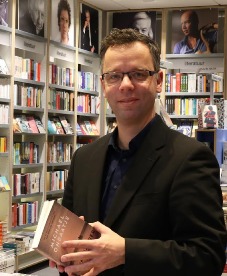Opinion | Take pupils seriously and Dutch will flourish again

According to Prof. Mathijs Sanders, Professor of Modern Dutch Literature , the school subject Dutch has wrongfully become the subject that does not receive its deserved attention. ‘Dutch is too often seen as a “service subject” in which skills are taught to serve other subjects. If we want to respect and stimulate the pupils’ creative intelligence, we need to offer teachers career prospects and bring academic research into classrooms. Now that tens of thousands of pupils are taking their final exams, it is the right time to think of how we can make Dutch a modern subject that matters, taking pupils and teachers seriously.’
Written down by Jaap Ploeger, Corporate Communicatie UG
A hollowed-out subject
‘Unfortunately, over the past few decades, Dutch has increasingly become more of a service subject in which certain skills are mainly taught to serve the rest of the curriculum. Pupils certainly need to develop their presentation skills, their ability to write book reports, and their reading strategies, but the subject of Dutch is so much more: cultural identity, which includes literature, communication, and language development. The assessment of skills at the national final exam is mostly limited to reading an amended newspaper article where signal words need to be identified. The needlessly simplified texts are not challenging at all. It is also a pity that essay writing is no longer a part of the final exam, since it is the perfect component to not only assess grammar, spelling, and writing, but also to appeal to creative intelligence.’
Science in the classroom
‘When secondary school pupils visit the University, I introduce them to the various aspects of the field. Linguistics and research on language disorders are such interesting parts of the field, but pupils simply do not know that these are also part of Dutch language studies. If you can introduce these topics during secondary school education, surely there will be more pupils who think, “yes, I want to pursue that subject”. You will involve pupils who are already reading and writing a lot themselves, but also those who are drawn to rap, poetry, or spoken word, for example. These pupils might all be interested in choosing the Dutch Bachelor's degree programme.’
A content subject with passionate teachers
‘Dutch should become a ‘content subject’ again: substantive, relevant, and fitting with the experiences of pupils. That also means it should deal with much more than the skills mentioned above. It is important that the focus is on the joy of language and literature. In a time when great Dutch young adult fiction is published and spoken word and ‘BookTok’ are popular, the subject of Dutch needs to move with these developments. There are many opportunities there. Luckily, there is a great number of passionate teachers who ignite and feed their pupils’ enthusiasm next to using traditional teaching methods. They are doing this even though teaching is not the challenging and esteemed job it should be. Too few young people choose for a career in education. Those who do start working in education often leave the field after a couple of years, and that in a time of considerable ageing. If the government and society start taking teaching seriously again, both in terms of reward and recognition, I am convinced that more students will decide to study Dutch at the university, and will eventually choose to become teachers.’
More news
-
16 December 2025
How AI can help people with language impairments find their speech
-
18 November 2025
What about the wife beater? How language reinforces harmful ideas
-
03 November 2025
Menopause in perspective: How the media influences our perception
